What is the oldest continuing electoral system in the world? It might be the conclave that elects the Bishop of Rome, known to the world as the Pope. For a thousand years a closed meeting of eligible voters has chosen the next Pope.
When the conclave has started the last few times, I have wondered how it works behind those closed doors. When I have brought up this question – how does it work – with colleagues and friends none have taken any interest in the subject, neither the psephologist nor the theologians of my acquaintance. I left it at that on those occasions.
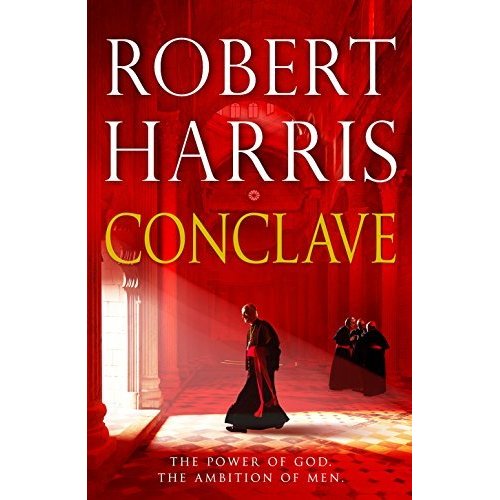
When I saw this title, I picked it up in the hope it would shed some light on some of the mysteries. It does!
Behind the closed doors there is a very specific procedure which has ancient and holy origins. Pedigreed it is, but it was only codified and published in 1996 by Pope John Paul II in the Apostolic Constitution. (See Wikipedia.) An earlier initiative in 1970 limited voting to cardinals under the age of 71.
In sum, there is a manager of the process from the Curia who looks after all the details of travel, housing, security, and so on, and chairs the voting sessions. There are two sessions each day. There are no preliminaries beyond the social niceties as the cardinals gather in Vatican City on the day before the Conclave begins. The next day they convene behind locked doors and vote. There is no talking, just praying, meditating, and voting.
The ballot is secret and they vote by writing the last name of the cardinal they support on a piece of paper and drop it in a receptacle. They do this one-at-a-time so the process is slow. A printed list of call cardinals is on each desk. They do not talk in the Conclave.
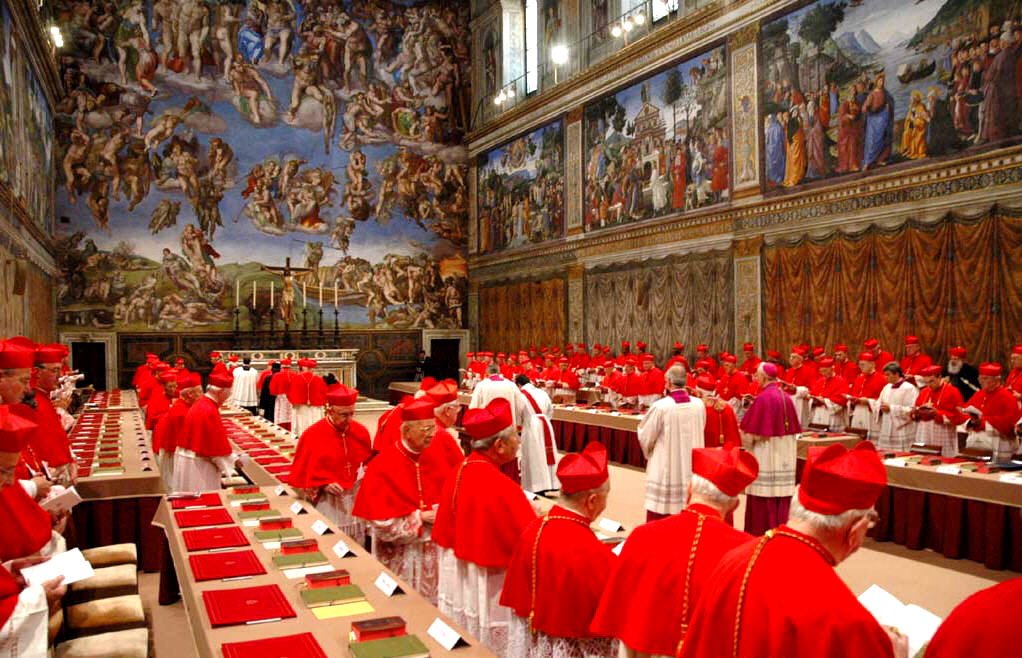
The votes are counted by three cardinals, previously designated by the manager, who in this case blindly drew names from a box. Selection is done publicly before the assembled cardinals. To count, each ballot is extracted one at a time, and the name on it read aloud. For 118 votes all of this takes time.
But wait there is more! When this count is done a second group of another three cardinals, also chosen earlier at random, recounts the votes, this time silently. When it confirms the results, the manager announces the distribution of the votes.
This practice stems from the mistrust and brutality of Papal election in bygone days. Think of that Borgia pope whom Jeremy Irons played as a clown.
To gain the crown a candidate must have a super-majority of two-thirds of the total vote. If no one reaches that figure, there is a break for lunch and another session in the afternoon. The proceedings are punctuated by pauses for prayer and meditation before and after each vote.
If someone secures the two-thirds majority, the deed is done. However, if after eight votes, no one reaches the super-majority, then in the ninth and any subsequent ballots the bar is lowered to a majority of fifty percent plus one of the votes cast.
As in any election, the greater the majority, the greater the moral authority of the electee.
The book is replete with such details and I found all of that very interesting. I will return to these formalities later, but there are also informalities to consider.
No one declares candidacy, but there are candidates aplenty in this story. There are many Italian cardinals and there are recognised leaders among them, more than one.
Leadership can take several forms, as an advocate of certain theological position, as an office bearer in the Curia, as an organiser of good works, as ….. Of the two leading Italians in this story one is an advocate of a return to old time religion of the Latin mass, the denunciation of Islam, etc and the other an intellectual who has long been Secretary of State for the Vatican City and is known far and wide as thoughtful, rational, cooperative, constructive, and one who can get things done.
In addition, the third world cardinals coalesce from the first dinner around an outstanding exemplar, though it not so clear to this reader why they he is so esteemed, apart from his titanium self-confidence.
The Curia always has an implicit candidate and in this account he is a Canadian, who, as the story unfolds, has been for years distributing Papal monies in a strategic way. (Guess!)
At the first dinner on the arrival date, these leaders sit at distant tables surrounded by their supporters. Any high school class president would recognise the pattern.
None is without sin, and each falls along the path of the voting. There is much drama, and the outside world intrudes.
The details about the voting left a few questions for me. Cardinals over seventy attended in this story but evidently they did not vote. What then did they do? Nap through the Conclave? They came all the way to Rome to nap, well, to show solidarity, but still it seems strange to command that they travel to Rome and yet once there to regard them as too infirm to vote with intelligence and good faith.
Moreover, it was not clear to me if the two-thirds requirement was based on eligible voters (those seventy and under) or all in attendance, one hundred and eighteen in this story, or the vote cast, though no one seems to have abstained in this story. Maybe I missed the explanation.
I was also surprised to learn that cardinals have different titles, Cardinal-Bishop, Cardinal-Priest, etc.
My reading left some gaps in the plot. I never did figure out who identified and sent for the Nigerian woman who was the downfall of one candidate. Nor was I sure why his one sin thirty years ago disqualified him.
Spoiler alert!
The winning candidate is the least likely, and this reader saw that coming from the first page when he was introduced. (Why else was he there?) How he came to the forefront is put down to the Holy Spirit. That may have satisfied some, but not all readers I should think. It is just too easy, I am afraid and my suspension of disbelief snapped there.
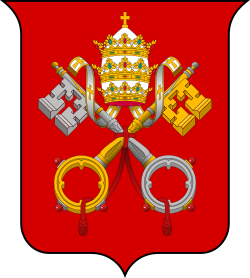
Both Wikipedia and Amazon’s mechanical turk indicate several other books about Papal elections and if ever I am motivated to return to the subject there is bibliography. Indeed, Harris offers some titles at the end of the book.
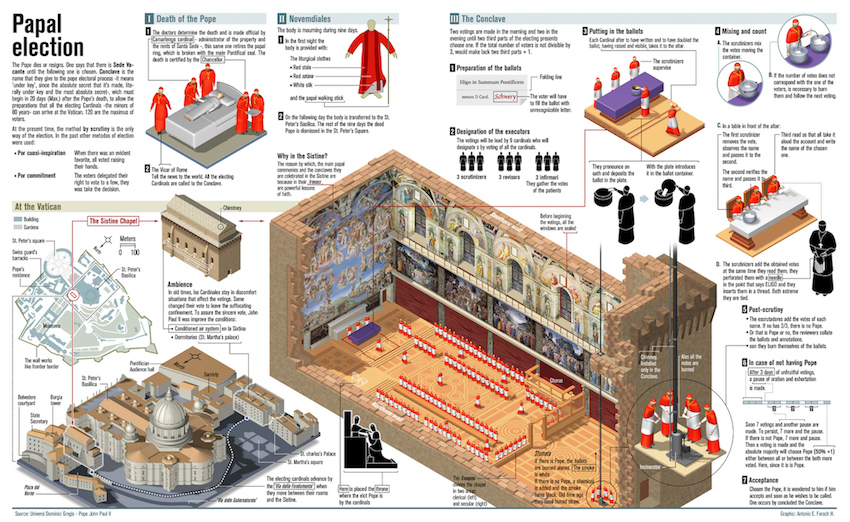 All is made clear. (Irony.)
All is made clear. (Irony.)
Robert Harris is a superb writer and he brings to life an interesting array of characters, endowing many with an interior life that is rich, complicated, humane, and realistic.
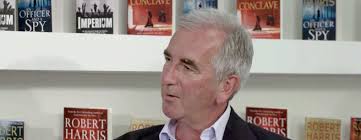 Robert Harris
Robert Harris
He treated the spiritual dimension with great skill. The sincerity of the believers is given full measure and the story is richer for it. There is sin, but there are no villains.
His three volume novel about Cicero is only thing I have read, and I have read a lot about Cicero, that made sense of Cicero’s contradictions. Sometimes fiction is the best way to make sense of facts.
Skip to content
